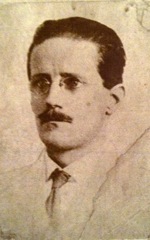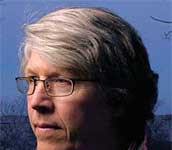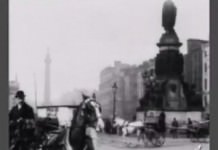
From The Public Domain Review. Go to the site for the link to the audio file.
Joyce made this recording in Paris at the HMV studios at the insistence of Sylvia Beach (the woman behind Shakespeare and Company, the publisher’s of Ulysses), although HMV would only loan out their equipment at a cost and would have as little to do with the recording as possible. Beach recounts:
Joyce himself was anxious to have this record made, but the day I took him in a taxi to the factory in Billancourt, quite a distance from town, he was suffering with his eyes and very nervous. Luckily, he and Coppola were soon quite at home with each other, bursting into Italian to discuss music. But the recording was an ordeal for Joyce, and the first attempt was a failure. We went back and began again, and I think the Ulysses record is a wonderful performance. I never hear it without being deeply moved. Joyce had chosen the speech in the Aeolus episode, the only passage that could be lifted out of Ulysses, he said, and the only one that was “declamatory” and therefore suitable for recital. I have an idea that it was not for declamatory reasons alone that he chose this passage from Aeolus. I believe that it expressed something he wanted said and preserved in his own voice. As it rings out – ‘he lifted his voice above it boldly’ – it is more, one feels, than mere oratory.
…
This recording of Joyce reading was made in 1929 by C.K. Ogden (the linguist, philosopher, and inventor of Basic English) in the studio of the Orthological Society in Cambridge. Ogden boasted of the two biggest recording machines in the world and wanted to do a better recording of Joyce than the Ulysses recording of 5 years earlier which he regarded as being of very poor quality. Sylvia Beach again:
How beautiful the “Anna Livia” recording is, and how amusing Joyce’s rendering of an Irish washerwoman’s brogue! This is a treasure we owe to C. K. Ogden and Basic English. Joyce, with his famous memory, must have known “Anna Livia” by heart. Nevertheless, he faltered at one place and, as in the Ulysses recording, they had to begin again. Ogden gave me both the first and second versions. Joyce gave me the immense sheets on which Ogden had had “Anna Livia” printed in huge type so that the author-his sight was growing dimmer-could read it without effort. I wondered where Mr. Ogden had got hold of such big type, until my friend Maurice Saillet, examining it, told me that the corresponding pages in the book had been photographed and much enlarged.
































